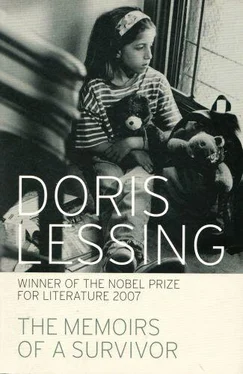We stood there for a while, watching the bustle and movement, watching the children at work.
'They get money, you see,' said Emily. 'Or get something in exchange — even the kids at school come here for an hour or so.'
And I saw that indeed, among these children, some of whose faces were familiar enough, from the pavement, were some better-dressed, cleaner, but above all with that wary self — contained I'm-only-here-on-my-own-terms-look that distinguishes the youngsters of a privileged class when engaged in work that is beneath their conception of themselves. They were here, in short, doing the equivalent of the holiday tasks of middleclass children in the old days — packing goods for firms, cleaning in restaurants, selling behind the counter. Yes, I could have noticed this without Emily, in time; but her shrewd eyes were on me hastening the process; she really was finding me slow to take in, to adapt, and when I did not seem to have understood as quickly as she thought I should, set herself to explain. It seemed that as people left these upper floors empty, to flee from the city, dealers had moved in. It was a large building, much heavier and better — built than most, with good thick floors that could take weight. Mr Mehta had bought rights in a rubbish dump before the government had commandeered all rubbish dumps, and was in business with various people — one was Gerald's father, a man who had once run a business making cosmetics. Usable stuff from the dump was brought here, and sorted out, mostly by children. People came up here to trade. A lot of the goods were taken down again to the street markets and shops.
Goods that were broken and could be mended were put right here: we passed rooms where skilled people, mostly older ones, sat and mended — gadgets, broken saucepans, clothes, furniture. There was in these rooms a great liveliness and interest: people stood around watching. An old man, a watch — mender, sat in a corner, under a light specially rigged up for him, and around him, fascinated, hardly drawing breath, pressed in a thick crowd — so thick that a guard kept asking them to stand back, and when they did not held them with a cudgel. They hardly noticed this, so intent were they, old and young, men and women, watching this precious skill — an old man's hands at work in the tiny machinery.
There was a woman fitting lenses to spectacle frames. She had an oculist's chart on the wall, and according to its findings was handing out second-hand spectacles to people who stood in a line and who, one after another, took from her a pair that she considered suitable. An oculist from the old days; and she, too, had a crowd of admirers. A chair-mender, a basket-mender surrounded with his twisted rushes and reeds, a knife-grinder — here they all were, the old skills, each with a guard, each watched by marvelling barbarians.
What wasn't to be seen in the rooms we passed through, one after another? String and bottles, piles of plastic and polythene pieces — the most valuable, perhaps, of all commodities; bits of metal, wire flex, plastic tape; books and hats and clothes. There was a room full of things that seemed quite new and good and had reached the rubbish dumps shielded from dirt and spoiling: a jersey in a plastic bag, umbrellas, artificial flowers, a carton full of corks.
And everywhere the pressing lively people, here as much for the show as for the goods. There was even a little cafe in one room, selling herbal teas, bread, spirits. A lot of people seemed tipsy, but they often do at markets, without alcohol. It was hard to tell the sellers from the buyers, the owners from the visitors; it was a polyglot crowd, a good-natured crowd, who respected the orders and instructions of the many guards; an orderly crowd, and one able in the new manner to settle among themselves disputes and differences quickly and without bad feeling being allowed to fester. People joked, showed each other their purchases, and even bought and sold from each other, without going to the formality of engaging the services of the official traders — a process which was quite in order and approved of. What the traders wanted was a crowd, was plenty of people, was the flow of goods, in and out.
We made a tour of the entire floor, and, having been greeted by innumerable people — many of the people from the pavement were up here, again entered the room for electrical goods and pushed forward our trolley. For this merchandise we were given a few vouchers, and I said to Emily that since it was her enterprise that had brought us there, she should have the spending of the results of it. She looked quizzical — I had come to expect this, and understood it was because I might be expecting too much in the way of a return. And what would be done, I wanted to know, with our toasters and roasters? Well, they would be dismantled for their parts, and these parts would be incorporated into other objects — obviously they were of no use as they were? Surely I didn't mind seeing them go? Well, if I didn't mind, she would very much like to take to Gerald's house — was I sure I didn't mind? — some stuff for the kitchen, because they were short. We found an old saucepan, an enamel jug, a plastic bowl, a scrubbing brush: this was what we got in exchange for the electrical equipment of what had been, after all, a lavishly equipped flat.
Back in our flat, Emily put off her little girl charm, without which she could never have brought herself to take me up on an expedition she clearly felt was into her territory and a long way from mine; and sat observing me. She was wondering, I suppose, unflattering though that was, if I had really understood that goods, 'things,' were different commodities for her and for children like June; in some ways more precious, because irreplaceable, but also without value… no, that is not right, without personal value: things did not belong to people as they did once. Of course, this had been true among some people long before the time of getting and having had passed: all sorts of experiments in communalism had been worked through, apart from the fact that people like 'the Ryans' had dispensed with ideas of mine and thine, and this without any theories or ideas about it. June was June Ryan; her family had been the despair of the authorities long before the collapse of the old society, when things had still been assumed to be normal. And, as a Ryan… But more of this later, when I describe 'the Ryans' in their proper place…
Why am I postponing it? This place will do as well as another. In my wanting to postpone what has to be said for the sake of the narrative about the Ryans, no more than an extension and a reflection of the attitudes and emotions of the said authorities towards 'the Ryans'? The point being that 'the Ryans', meaning a way of life, were unassimilatable, both in theory — theories about society and how it worked — and in practice?
To describe them, their circumstances — nothing here that the reader won't have heard a hundred times: it was a textbook case, as the social workers kept exclaiming. An Irish labourer had married a Polish refugee. Both were Catholics. In due time there were eleven children. He drank, was brutal, was intermittently affectionate. She drank, was hysterical, incompetent, unpredictably loving. The children would not stay in school. Welfare authorities, housing authorities, the police, the psychologists, all knew the Ryans. Then the two older boys were in court for stealing, and went to Borstal for a time. The second — not the oldest — girl, got pregnant. She was fifteen. No, there is nothing unfamiliar about any of it, but the Ryans' case seemed to be bigger and more hopeless because there were so many of them, and because both parents were large and colourful characters whose sayings were likely to be quoted at conferences and at meetings: it often happens that a single case takes wing out of its anonymity and represents others: in our city alone there were thousands of 'Ryans' of all kinds, colours, nations, unknown except to their neighbours and to the authorities, and these people in due time found themselves in prison, Borstal, remand homes, and so on. But some charity interested itself in the Ryan family, they were installed in a house: efforts were made to keep them together.
Читать дальше
Конец ознакомительного отрывка
Купить книгу












